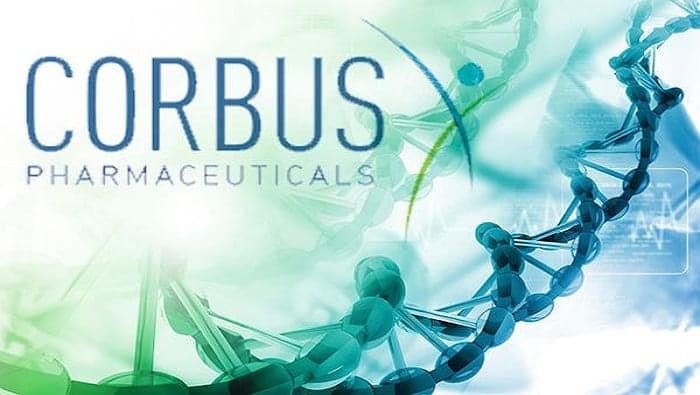Corbus Pharmaceuticals Holdings, Inc. (NASDAQ: CRBP) (“Corbus” or the “Company”), a clinical stage drug development company targeting rare, chronic, serious inflammatory and fibrotic diseases, announced today its financial results for the third quarter ended September 30, 2017.
The Company also provided an update on its corporate progress, clinical status and anticipated milestones for anabasum, its novel synthetic oral endocannabinoid-mimetic drug that is designed to resolve chronic inflammation and halt fibrosis in rare autoimmune inflammatory diseases.
Recent Clinical and Corporate Achievements
Reported positive, statistically significant 6-month clinical data from the ongoing open-label extension (“OLE”) study in systemic sclerosis (“SSc”) which is a continuation of the positive double-blind placebo-controlled Phase 2 study reported in November 2016;
Reported positive, statistically significant Phase 2 results from the double-blind, randomized, placebo-controlled trial in dermatomyositis (“DM”), a rare autoimmune disease;
Raised $32.5 million in gross proceeds from a secondary public offering;
Appointed Mr. Paris Panayiotopoulos to Board of Directors; and
Awarded U.S. Patent covering the use of pharmaceutical compositions comprising anabasum for treatment of rare autoimmune, inflammatory diseases through 2034.
“We are very proud that in less than four years we have successfully executed our clinical development and corporate strategy enabling us to be in position to launch our first Phase 3 late-stage study. Over the past 12 months, we have reported positive Phase 2 clinical data in succession in three distinct rare diseases with significant morbidity and mortality and that, combined, affect over 200,000 individuals in the US and EU,” stated Yuval Cohen, Ph.D., Chief Executive Officer of the Company. “This important progress has positioned us for the solid implementation and execution of our four clinical studies in systemic sclerosis, cystic fibrosis, dermatomyositis and lupus. We are looking ahead to an exciting 2018.”
Systemic Sclerosis Clinical Program Update
On November 5, 2017 at the American College of Rheumatology (“ACR”) Annual Meeting, Corbus presented 6-month data from the on-going OLE study in systemic sclerosis. Thirty-six subjects are participating in the ongoing OLE which followed the conclusion of the 16-week double blind placebo controlled study. Subjects continued to improve in multiple clinical endpoints including a mean improvement in the modified Rodnan Skin Score (mRSS) of -8.4 points (p < 0.0001) from baseline at the start of the Phase 2 double blind placebo controlled portion of the study. 75% of subjects achieved a degree of improvement in mRSS (reduction ≥ 5 points and > 25% baseline) that has been associated with improved survival and exceeds that previously reported in other clinical trials or registries in systemic sclerosis. A third of the subjects reached a low mRSS ≤ 10 points. The ACR Composite Response Index in diffuse cutaneous systemic sclerosis score (ACR CRISS) continued to increase steadily with anabasum treatment and reached 71% (median) from study start. The speed and degree of improvement in multiple efficacy outcomes exceeds that previously reported in other clinical studies or registries in systemic sclerosis. To access the open label data and other five posters presented at ACR please click here.
Corbus is on track to commence a Phase 3 study of anabasum for the treatment of systemic sclerosis with the mRSS as the primary endpoint before year end and expects to report topline results before the end of 2019.
Systemic sclerosis is a chronic, systemic autoimmune rheumatic rare disease with an unclear etiology that affects approximately 90,000 people in the United States and Europe, with disease onset typically in mid-life and lung fibrosis resulting in a 10-year mortality rate of 40-60%. Currently, there are no FDA-approved treatments specifically indicated for the treatment of SSc, other than pulmonary artery hypertension secondary to connective tissue diseases such as SSc.
Anabasum has been granted Orphan Drug Designation and Fast Track status for the treatment of systemic sclerosis from the FDA and Orphan Designation from the EMA.
In March 2017, Corbus reported positive topline data from the double-blind, randomized, placebo-controlled Phase 2 study of anabasum for the treatment of CF showing that anabasum, compared to placebo, reduced the rate of pulmonary exacerbations, reduced multiple inflammatory biomarkers and had an acceptable safety and tolerability profile. The 16-week study was an international, multi-center study supported by a $5 million Development Award from Cystic Fibrosis Foundation Therapeutics, Inc. Data from this study was presented at the European Cystic Fibrosis Society (“ECFS”) conference in June 2017 and was also recently presented at the North American Cystic Fibrosis Conference (“NACFC”). To access the posters presented at NACFC, please click here.
Cystic fibrosis is a chronic, life-threatening, genetic rare disease, characterized by chronic lung inflammation that leads to lung damage and fibrosis that affects approximately 30,000 patients in the U.S and 75,000 patients worldwide. The current average life expectancy for CF patients is 40 years. The harmful inflammation and accompanying fibrosis in CF damages multiple organs, impairs organ function, reduces health-related quality of life, and is the most common cause of mortality. There remains a recognized unmet need for safe and effective drugs that target chronic inflammation and fibrosis for the treatment of CF without the risk of immunosuppression currently associated with existing anti-inflammatory drugs.
Anabasum has been granted Orphan Drug Designation and Fast Track status for the treatment of CF by the FDA and Orphan Designation from the EMA.
In October 2017, Corbus announced positive topline results from its Phase 2 study evaluating anabasum for the treatment of skin-predominant dermatomyositis, demonstrating medically and statistically significant improvement in the Cutaneous Dermatomyositis Disease Area and Severity Index (CDASI), the primary endpoint in the study. Improvements in multiple secondary patient-reported outcomes, including a number that achieved statistical significance, reinforce the signal of activity of anabasum in dermatomyositis.
Detailed Phase 2 results of safety and primary and secondary efficacy assessments were presented in a late-breaking poster presentation at the ACR Annual Meeting. Demographics and baseline characteristics of subjects were also presented in a second poster presentation. To access the ACR posters please click here.
Dermatomyositis is a rare and serious systemic autoimmune condition characterized by skin and muscle inflammation that affects as many as 70,000 people in the US. Mortality is high with 5-year survival of 70% and 10-year survival of 57%. Current standard of care includes antimalarial drugs and potent immunosuppressive agents, which often lead to significant adverse effects.
About Anabasum
Anabasum is a synthetic oral endocannabinoid-mimetic drug that preferentially binds to cannabinoid receptor type 2 (CB2) expressed on activated immune cells and fibroblasts. CB2 activation triggers physiologic pathways that resolve inflammation, speed bacterial clearance and halt fibrosis. Nonclinical and human clinical studies to date have shown anabasum has favorable safety, tolerability and pharmacokinetic profiles. It has also demonstrated promising potency in nonclinical models of inflammation and fibrosis. Anabasum is designed to trigger the production of “Specialized Pro-resolving Lipid Mediators” that activate an endogenous cascade responsible for the resolution of inflammation and fibrosis, while reducing production of multiple inflammatory mediators. Anabasum also is designed to have a direct effect on fibroblasts to halt tissue scarring. In effect, anabasum is believed to trigger endogenous pathways to turn “off” chronic inflammation and fibrotic processes without causing immunosuppression.
About Corbus
Corbus Pharmaceuticals Holdings, Inc. is a Phase 3 clinical stage pharmaceutical company focused on the development and commercialization of novel therapeutics to treat rare, chronic, and serious inflammatory and fibrotic diseases. The Company’s lead product candidate, anabasum, is a novel synthetic oral endocannabinoid-mimetic drug designed to resolve chronic inflammation and fibrotic processes. Anabasum has generated positive data in three Phase 2 studies in diffuse cutaneous systemic sclerosis, cystic fibrosis and dermatomyositis. Additionally, the Company is evaluating anabasum in open-label extension studies in systemic sclerosis and skin-predominant dermatomyositis. The Company expects to commence a Phase 2 study in systemic lupus erythematosus, a Phase 3 study in systemic sclerosis and a Phase 2b study in cystic fibrosis in the fourth quarter of 2017.
For more information, please visit www.CorbusPharma.com
Investor Contact
Jenene Thomas
Jenene Thomas Communications, LLC
Phone: (908) 938-1475
Email: jenene@jenenethomascommunications.com
Media Contact
Nic DiBella
JPA Health Communications
Phone: (617) 657-1307
Email: Nic@jpa.com



















